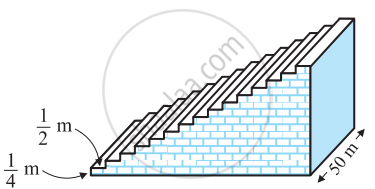Advertisements
Advertisements
प्रश्न
Find the sum 2 + 4 + 6 ... + 200
उत्तर
In the given problem, we need to find the sum of terms for different arithmetic progressions. So, here we use the following formula for the sum of n terms of an A.P.,
`S_n = n/2[2a + (n -1)d]`
Where; a = first term for the given A.P.
d = common difference of the given A.P.
n = number of terms
2 + 4 + 6 ... + 200
Common difference of the A.P. (d) = `a_2 - a_1`
= 6 - 4
= 2
So here,
First term (a) = 2
Last term (l) = 200
Common difference (d) = 2
So, here the first step is to find the total number of terms. Let us take the number of terms as n.
Now, as we know,
`a_n = a + (n -1)d`
So, for the last term,
200 = 2 +(n - 1)2
200 = 2 + 2n - 2
200 = 2n
Further simplifying,
`n = 200/2`
n = 100
Now, using the formula for the sum of n terms, we get
`S_n = 100/2 [2(2) + (100 - 1)2]`
= 50 [4 + (99)2]
= 50(4 + 198)
On further simplification we get
`S_n = 50(202)`
= 10100
Therefore, the sum of the A.P is `S_n = 10100`
APPEARS IN
संबंधित प्रश्न
A small terrace at a football field comprises 15 steps, each of which is 50 m long and built of solid concrete. Each step has a rise of `1/4` m and a tread of `1/2` m (See figure). Calculate the total volume of concrete required to build the terrace.
[Hint: Volume of concrete required to build the first step = `1/4 xx 1/2 xx 50 m^3`]

Find the sum of the first 15 terms of each of the following sequences having the nth term as
yn = 9 − 5n
Find four consecutive terms in an A.P. whose sum is 12 and sum of 3rd and 4th term is 14.
(Assume the four consecutive terms in A.P. are a – d, a, a + d, a +2d)
Two A.P.’ s are given 9, 7, 5, . . . and 24, 21, 18, . . . . If nth term of both the progressions are equal then find the value of n and nth term.
If the sum of P terms of an A.P. is q and the sum of q terms is p, then the sum of p + q terms will be
If the sums of n terms of two arithmetic progressions are in the ratio \[\frac{3n + 5}{5n - 7}\] , then their nth terms are in the ratio
In an A.P. (with usual notations) : given a = 8, an = 62, Sn = 210, find n and d
If a = 6 and d = 10, then find S10
Find the sum of natural numbers between 1 to 140, which are divisible by 4.
Activity: Natural numbers between 1 to 140 divisible by 4 are, 4, 8, 12, 16,......, 136
Here d = 4, therefore this sequence is an A.P.
a = 4, d = 4, tn = 136, Sn = ?
tn = a + (n – 1)d
`square` = 4 + (n – 1) × 4
`square` = (n – 1) × 4
n = `square`
Now,
Sn = `"n"/2["a" + "t"_"n"]`
Sn = 17 × `square`
Sn = `square`
Therefore, the sum of natural numbers between 1 to 140, which are divisible by 4 is `square`.
If the nth term of an AP is (2n +1), then the sum of its first three terms is ______.
